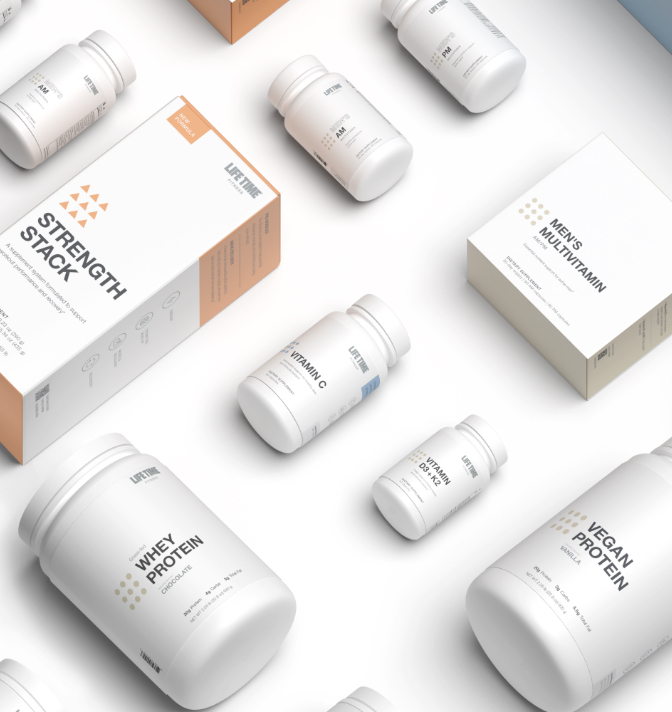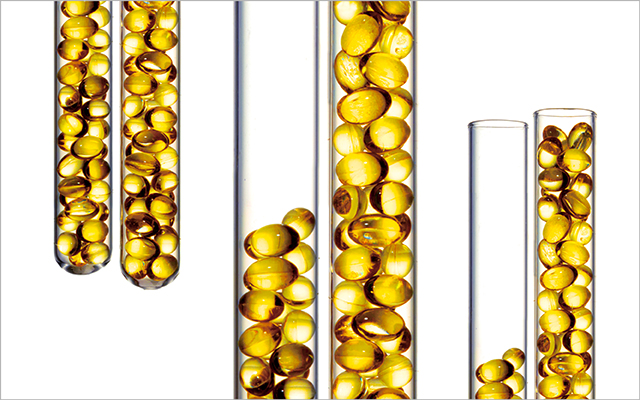Why Vitamin D?
With Anika Christ, RD, CPT
Season 4, Episode 11 | November 16, 2021
Vitamin D is the most common micronutrient deficiency — but it’s also one that we can prevent with relative ease. In this mini episode, Anika Christ, RD, CPT, explains why vitamin D is critical to our health, including its role in immunity, and offers ways we can make sure our bodies get optimal levels.
Anika Christ, RD, CPT, is the director of client optimization at Life Time. She’s known to many as “Coach Anika” and leads a number of digital programs at Life Time, including the D.TOX program.
In this mini episode, Christ offers advice for those seeking to improve their vitamin d status:
- Go out in the sun. The best source of vitamin D is your body’s own production from exposure to the sun. Christ advises getting outdoors in the sunlight without sunscreen for 10 minutes twice daily to help aid optimal levels.
- Support with supplementation. Many people live in climates where it’s not possible to get the sun exposure needed to achieve optimal vitamin-D levels, and since there aren’t many food sources, a high-quality supplement can be helpful. The Vitamin D Council recommends 5,000 IU for adults and 1,000 IU for every 25 pounds of body weight for kids.
- Check your levels. The diagnostic range, which is what you’ll see most physicians benchmark against, suggests aiming for levels between 30 and 100. However, Christ says optimal levels are closer to being between 60 and 80.
- How Much Vitamin D Should You Take?
- 5 Tips to Supplement With Vitamin D
- Vitamin D: What You Need to Know
- The Nutrition and Supplementation Guide to Supporting Your Immune System
- The Ultimate Guide to Immune-Supportive Supplements
- Low Vitamin-D Levels Linked to Increased COVID-19 Death Risk
- The Vitamin D Debate

Nutritional Supplements
Optimize your nutrition and fill in nutrient gaps with daily essentials and specialty supplements.
Also Explore:
Protein Powder
The Foundational Five Supplements
ADVERTISEMENT
More Like This
How Much Vitamin D Should You Take?
Here are five expert tips to help you calibrate your vitamin D intake.
5 Tips to Supplement With Vitamin D
If you can’t sufficiently raise your vitamin D levels with whole foods or sunshine, here are ways to supplement wisely.
The Nutrition and Supplementation Guide to Supporting Your Immune System
Discover which foods and supplements are essential for helping your body build a strong immune system.
Transcript: Why Vitamin D?
Season 4, Episode 11 | November 16, 2021
Jamie Martin
Welcome to Life Time Talks, the healthy-living podcast that’s aimed at helping you achieve your health, fitness, and life goals. I’m Jamie Martin, editor-in-chief of Experience Life, Life Time’s whole-life health and fitness magazine.
David Freeman
And I’m David Freeman, Life Time’s national digital performer brand leader. We’re all in different places along our health and fitness journey, but no matter what we are working toward, there are some essential things we can do to keep moving in the direction of a healthy, purpose-driven life.
Jamie Martin
In each episode, we’ll break down the various elements of healthy living, including fitness and nutrition, mindset and community, and health issues. We’ll also share real inspiring stories of transformation.
David Freeman
And we’ll be talking to experts from Life Time and beyond, who’ll share their insights and knowledge, so you’ll have the tools and information you need to take charge of your next steps. Here we go.
[MUSIC]
David Freeman
In this episode, we’re going to be talking about vitamin D with coach Anika.
Anika Christ
Hello.
David Freeman
Hey, hey.
Jamie Martin
Alright. Tell us, what is vitamin D, and why does it matter for health?
Anika Christ
Vitamin D is a micronutrient that acts more like a hormone in your body, and it’s the most common micronutrient deficiency, but probably the most preventable. So I’m super passionate about people getting optimal levels of vitamin D. It works for a lot of things as far as metabolism goes, and if your levels are not optimal, you actually raise your risk of dementia, diabetes, getting sick like the flu, bone loss, all sorts of things. So it is a very hot topic in the nutrition world, and we’re talking micronutrients.
David Freeman
Hot topic. So let’s talk about the sun. Doesn’t that give us some vitamin D?
Anika Christ
Yeah.
David Freeman
When we think about that, and you’re saying it’s the number one, or probably one of the top ones that people are deficient in, why do you think that is?
Anika Christ
I do think it’s we are not outside enough anymore, because we all fear the sun. But that as far as the best sources of vitamin D, it is actually your own production from getting exposure to the sun without sunscreen, though. So usually what we’ll say is twice a day for 10 minutes with no sunscreen is your optimal way to produce optimal levels of vitamin D.
And then of course for a lot of people supplementation becomes a necessity, because where they live, how far away they are from the equator. These northern climates, like Minnesota, where it’s cold seven to eight months a year, and it’s hard to get outside, we’re usually more likely to be deficient and not have optimal levels.
David Freeman
Would you say liquid or capsule form as far as when doing supplementation?
Anika Christ
You know what? Either/or. So we do both in our house. I have little kids, and especially during cold and flu season, I usually give them a little bit more vitamin D to act as a preventative. So they do liquid, but capsule form for — I was going to say “parents,” but adults, is generally fine.
The liquid is nice because you can be a little bit more prescriptive with your dose, which we’ll talk about how much is optimal for most people. But if you’ve measured your levels, you know you need 6,000 a day, and the capsule is 5,000, liquid would give that more readily available. So you can decide what you need.
Jamie Martin
How do we check our vitamin D levels, and how often should we check?
Anika Christ
I’m a fan of twice a year. So I always say after the sunny months, so after summer is over, it’s a really good time to say, hey, how did I do with my own production? Especially in the warmer weather. And then after the coldest months of the year. So usually for my clients up here in Minnesota, it’s the fall and then early spring, right after the winter period. I’ll say, check it. You can ask your doctor, that is a test. I feel like they are more common checking more preventatively. Otherwise at Life Time we also have lab panels that include vitamin D, as well.
David Freeman
And we usually have this connection from vitamin D and calcium. You usually hear them both together. And when I think of calcium I think of bones, I think of teeth, so on and so forth. So can you correlate that relation to both vitamin D and calcium?
Anika Christ
If one is off sometimes the other one will follow, otherwise the other one can’t do what its job is. That’s why micronutrients are really hard. And it’s rare that we will tell people to supplement micronutrients individually without testing, or making sure we look at the other ones in addition.
So calcium is often cause for bone health, right? And your storage. And what’s interesting is vitamin D, as far as food sources, there’s not many. But back in the day when we would drink whole milk, that was way more common. I have a lot of clients that’ll say, oh, the red milk jug. Because red had a big vitamin D on it.
That’s what my dad always says, that’s the vitamin D milk. And that’s what’s hard is when you strip fat, which a lot of us if we drink milk, drink skim milk, or 1%, you actually can’t absorb that vitamin, and it’s stripped from that. It needs fat soluble. It’s a fat soluble vitamin, so it needs fat in it to actually digest and absorb. And calcium, same thing, people drink milk for calcium.
And I’m like, well, what kind of milk are you drinking? Because that’s actually really hard to get through milk today, too. Even through pasteurization. So I always tell people there’s other forms of that, such as broccoli, and a lot of the leafy greens have calcium in it, too. But that’s when I will not recommend supplementing, unless you check your levels, and know how your body is absorbing it. And that one actually absorbs better with magnesium attached to it. So the three kind of work hand in hand together.
Jamie Martin
Go together. So let’s talk about vitamin D levels, because there is some debate around what’s optimal. So what do you view as optimal vitamin D levels, and why?
Anika Christ
I will say, what I was always trained by naturopathic physicians, and what I’ve seen people, is 60 to 80 on the scale. And usually the diagnoses scale will say 30 to 100. And I will say, I see a lot of people below 30, though. So they’re below optimal and diagnostic, where they have clinically low vitamin D levels. So that is more common than not.
Maybe I’ll see someone sub 60, but above 30, but we always talk like how often do you get sick? You’d be surprised the correlation with that. And that’s something I ask my clients, is if you feel like you’re getting more than two colds a year, like you’re constantly getting the next bug, you should check your vitamin D, because there’s a big — I would hypothesize that you’re likely to have a lower than optimal, or even clinically low level, if you’re getting sick too often.
David Freeman
Let’s talk about the immunity, because that’s something that you talked about. You give it to your girls in the colder months, when it’s a little bit more prevalent as far as colds, and whatever else might be going on. So what exactly is vitamin D doing? And I know you kind of tapped on it a little bit, but what exactly is vitamin D doing to prevent the sickness that might be coming upon us?
Anika Christ
Well, it kind of works hand in hand with a few other things. So you have a gut, or an immune system, where in your gut 70% of your immune system lives there. So vitamin D kind of works hand in hand with that, but ideally, if you have optimal levels, your body’s immune system won’t be on — its kind of fight or flight mode a lot of the time.
So if you’re giving enough nutrition, because it still works as a nutrient with a fat soluble nutrient, but the hormone itself activates what’s called a prohormone, because it activates all these other hormones in your body, tied to your immune system, tied to your bones, tied to your sex hormones, a lot of things.
So I tell people if that’s deficient, and your other hormones can’t pull from that, or aren’t able to rely on that to do their job, that’s when it all kind of falls off. There’s a lot of naturopaths that will actually say, if you’re starting to feel sick, increase your usual dose of vitamin D. And I’ve had a lot of clients, subjectively of course, say, yeah, actually I feel like my cold was gone the next day.
So there is a lot of interesting things that I don’t think are showing through research just yet, more subjective mode. But the idea is there’s a lot of debate on, should we be supplementing this like, hormone in your body if your body is supposed to produce it on its own? And I always tell my clients well, if you can get sunlight every day, and you can check and see if your body’s making enough, you’re good. That’s the best part. You can do it yourself. But the reality is a lot of people won’t or can’t do that. So that’s where the supplementation comes in.
Jamie Martin
Got it. So let’s talk about to maintain optimal vitamin D levels, what is recommended for kids, for adults, et cetera?
Anika Christ
I always use the vitamin D council because they are the ones doing all the research with unbiased research and science. And what they suggest is for kids you have to base it off of weight. So it’s 1,000 IUs for every 25 pounds of body weight. That’s a really good way. And a lot of really great kid multivitamins will have 1,000 in it usually. So I always tell people you might need to add more, or you might get enough in your current multivitamin if it’s a high quality, absorbable form.
For adults they’ve suggested 5,000, and that’s changed in the last like 5 to 10 years. Because when I entered nutrition it was like maybe 1,000 a day for adults. So that’s radically changed based off of our population, and what measurements are saying. So ideally 5,000 per day, but check your levels because I have clients — again, we live in a colder population but during the winter they might take 10,000 a day to feel good.
Because it can actually help with energy and stuff, too. So a lot of people will feel their vitamin D. There could be other things going on, but be like, I feel like maybe I need to check my vitamin D. But it’s a huge part even with blood pressure. It feeds what we call the angiotensin system that regulates your blood pressure, too. So just check it. That’s what I would say.
Jamie Martin
It’s connected to so many biological functions, so many things.
David Freeman
I want to focus on keeping it simple and seamless for our listeners to absorb the vitamin D. See what I did there? Alright. So if you were to think of a sport, right? You know all the positions like, for football?
Anika Christ
No. Maybe. I don’t know. Try me.
David Freeman
Let’s go, let’s go with it. OK. If vitamin D was a position within the sport of football, what role would it play?
Anika Christ
Quarterback, because it’s telling what everyone needs to do. I knew that one.
David Freeman
Yes. Hey.
Jamie Martin
She’s got it
David Freeman
QB.
Anika Christ
I’m the head coach, though. Just kidding.
David Freeman
I like it.
Jamie Martin
I love it. Alright, Anika. That was quick hit on vitamin D.
Anika Christ
Love it.
Jamie Martin
Thanks for being here.
Anika Christ
You bet.
[MUSIC]
David Freeman
Thanks for joining us for this episode. As always, we’d love to hear your thoughts on our conversation today, and how you approach this aspect of healthy living in your own life. What works for you? Where do you run into challenges? Where do you need help?
Jamie Martin
And if you have topics for future episodes, you can share those with us, too. Email us at lttalks@lt.life, or reach out to us on Instagram, @lifetime.life, @jamiemartinel, or @freezy30, and use the hashtag #LifeTimeTalks. You can also learn more about the podcast at el.lifetime.life/podcasts.
David Freeman
And if you’re enjoying Life Time Talks, please subscribe on Apple Podcasts, Spotify, Google Podcasts, or wherever you get your podcasts. Feel free to rate and review, and share on your social channels too.
Jamie Martin
Thanks for listening. We’ll talk to you next time on Life Time Talks.
Life Time Talks is a production of Life Time, healthy way of life. It’s produced by Molly Schelper, with audio engineering by Peter Perkins, and video production by Kevin Dixon, Coy Larson, and the team at LT Motion. A big thank you to the team who pulls together each episode, and everyone who provided feedback.
We’d Love to Hear From You
Have thoughts you’d like to share or topic ideas for future episodes? Email us at lttalks@lt.life.
The information in this podcast is intended to provide broad understanding and knowledge of healthcare topics. This information is for educational purposes only and should not be considered complete and should not be used in place of advice from your physician or healthcare provider. We recommend you consult your physician or healthcare professional before beginning or altering your personal exercise, diet or supplementation program.





